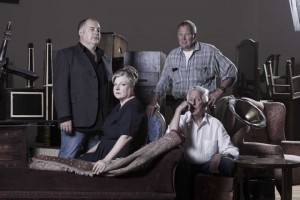 Presented by State Theatre of SA
Presented by State Theatre of SA
Reviewed Wed 28th April 2010
Venue: Dunstan Playhouse, Adelaide Festival Centre, King William Road
Season: Evenings: 29 & 30 April, 1, 6 – 8, 13 – 15 May, 8pm, Matinees: 12 May, 11am, 15 May, 2pm and 16 May, 5pm, Sunsets: 3 – 5, 11 & 12 May, 6.30pm
Duration: 2hrs 37min incl. 20 min interval
Tickets: Adult $45, Conc. $40, under 30s $29
Bookings: BASS 131 246 or www.bass.net.au
Written in 1968 this play comes from the middle of Arthur Miller’s (1915 –2005) long and prolific career. Not his best known play, this one has lasting value, as its themes are universal and timeless. As the play opens, policeman, Victor Franz, pushing fifty and due for retirement, enters the attic of a building that is due for demolition. He is surrounded by the furniture and effects of his late parents and awaiting the arrival of Gregory Soloman, who turns out to be a crafty, almost ninety year old Russian-Jewish antique dealer who is coming to value and, hopefully, purchase the entire load for a good price. Victor’s alcoholic wife, Esther, arrives shortly after and begins hassling him to be sure to haggle and get the most money that he possibly can for the furniture. She leaves and Soloman arrives shortly after, leading to a very humorous series of interchanges between the two men. Just as a deal is finally struck and money is changing hands, Walter, Victor’s highly successful older brother, a celebrated surgeon, arrives.
The brothers have not seen or spoken to one another for sixteen years, since the death of their father. The second act explores the reasons for their estrangement and the conceptions, or misconceptions, surrounding their awkward relationship. Old assumptions are challenged, personal values and life choices questioned and yet, at the end, little seems to have changed, the brothers part, the furniture is sold and it appears that they will continue as before. Recriminations, resentment, jealousy and anger come to the surface, but there is no reconciliation to be had for either brother.
Adam Cook’s production starts slowly, but eventually achieves a good pace, making excellent use of Ailsa Paterson’s incredible set, a derelict attic with bare floorboards, a decaying ceiling and mountains of mismatched furniture piled up precariously between those two extremities. Mark Pennington’s lighting accents the nooks and crannies and aids in inducing the sensation of age and what once was stylish now falling into dinginess.
Michael Habib as, as policeman Victor Franz, is very much the solid citizen, the man who plods away at his job, year after year, uncomplaining. One can easily picture him starting each day with coffee and a plentiful supply of doughnuts, the comfort food of the American policeman, before patrolling the beat in the extended comfort of an oversized, petrol guzzling car. Victor was academically the brighter of the two brothers, but gave up a possible career in science to look after his father, accepting a job that gave a regular income rather than attempting to aim for a position fulfilling his potential. There is a resentment that his brother left and never looked back, carving out a career and abandoning the family. Habib’s performance encompasses all of those mixed feelings of loyalty and resentment.
Carmel Johnson is wonderful as Victor’s supportive and long-suffering wife, Esther. Building as the play progresses, she hits her stride in the second act, delivering a commanding interpretation of her character. As the third corner of this awkward family triangle, Pip Miller, as Walter Franz, is the attempted voice of reason, arguing what he sees as the reality of the family history in the face of Victor’s denial and Esther’s desperate attempts to convince herself that he is mistaken. Miller gives a clear, lucid version of Walter, coldly recounting his conversations with the father. Miller’s is a finely tuned characterisation, bringing warmth to what might have been a sterile role and adding a new dimension to the work.
Dennis Olsen steals every scene, in the role of Gregory Soloman, his innate sense of timing in evidence in every raised eyebrow, sideways glance, intake of breath and non-verbal vocalisation, through to his carefully measured delivery of every syllable of his dialogue. Here is a master of the art at the peak of his profession. This alone is worth the price of admission, even without the other three fine performances. This is probably the best thing that State Theatre has offered for some time, so try to catch it.
Reviewed by Barry Lenny, Arts Editor Glam Adelaide.



















